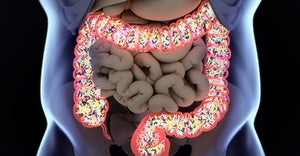Beating Brain Fog

By Dr. David M. Brady and Danielle Moyer, MS
We have all experienced the feeling at least once: you don’t get enough sleep and the next day you feel sluggish and can’t concentrate. That is the feeling of “brain fog”. Brain fog is not a medical condition, but rather a feeling of confusion, disorganization, and difficulty concentrating or focusing. But what happens when this becomes a chronic sensation? What is causing it and what can you do?
There are numerous explanations for chronic brain fog. It can result from poor sleep, stress, hormonal changes, poor diet, infections, heavy metal exposure, side effects of certain medications, or due to a medical condition, such as anemia, chronic fatigue syndrome, or fibromyalgia [1]. One study revealed through MRI scans that even non-celiac gluten sensitivity can induce brain fog in those who do not have celiac disease or a wheat allergy, but report gastrointestinal upset from gluten [2]. Additionally, long-haul COVID syndrome has been shown to impact a person’s cognitive dysfunction and fatigue for months after contracting COVID.
The good news is one of the strongest influences we have on our brain is through our gut.
Imagine there is a two-way street from your gut to your brain, where cars are continually driving up and down. Now instead of cars, imagine hormones. That two-way street is what we call the “Gut-Brain Axis”. “Listen to your gut” is advice that is actually backed up by science. Here are some hormones that drive up and down, influencing your emotions, mental function, and memory:
- Leptin: This hormone signals to your brain that you are full after eating, thereby reducing your appetite. It has been shown to impact synaptic plasticity in your brain, influencing spatial learning and long-term depression.
- Ghrelin: This hormone is secreted on an empty stomach, signaling to your brain to increase your appetite. It has also been shown to enhance spatial learning and memory function.
- Glucagon-Like Peptide 1 (GLP1): This hormone regulates energy metabolism by stimulating insulin secretion and energy uptake in muscle cells. It has also been shown to influence spatial memory, cognition, and emotion.
- Insulin: This hormone is secreted while you are eating to allow your body to convert the newly ingested food into immediately usable energy. Insulin has been shown to alter cognitive processing and synaptic activity [3].
Another important modulator on our brain’s functioning is our immune system, which fights off foreign pathogens and toxins. Chronic infections can lead to chronic inflammation, thereby causing detrimental effects on cognitive function and brain fog [1]. The gut’s role in our immune system is underscored as 70% of our entire immune system is located in our gut [4]!
Making sure there are no roadblocks, traffic jams, or slow pokes on the streets of our gut-brain-axis is crucial for beating brain fog.
Here are some important things to do to clear the way…
Eat as many whole foods as possible.
Whole foods consist of fruits, vegetables, legumes, beans, meat, fish, seafood, nuts, seeds, and whole grains that are immunologically tolerated well by you. They are not processed or refined and have minimal added ingredients to them. Plus, they are rich in antioxidants, fiber, and macro and micronutrients. Whole foods influence cognition and emotions through our gut-brain-axis by providing a warehouse of essential nutrients that support hormonal regulation and proper digestion.
For example, omega-3 fatty acids found in flax seeds, chia seeds, walnuts, and fatty fish have been shown to ameliorate cognitive decline in the elderly. They have become a treatment method for mood disorders and improved learning and memory [3].
Poor diets filled with processed foods or “junk” foods can lead to multiple vitamin and mineral deficiencies and also introduce pro-inflammatory foods that can contribute to brain fog, such as trans fats or excess sugar. It is best to limit these foods as much as possible.
Eat prebiotics and probiotics.
We have a thing called the “gut microbiome” in our gastrointestinal tract. This is where billions of bacteria live to help us break down food, modulate our immune system, balance hormones, and more. There are both beneficial and harmful bacteria that can live in our GI tract, and it is key to support the beneficial kinds. When we have a plentiful array of healthy bacteria, they produce hundreds of chemicals that influence mental processes such as learning, memory, and mood. In fact, "good" gut bacteria produce about 95% of our body’s supply of serotonin, which is a hormone that impacts both our mood and GI function [5-6].
“Prebiotics” can be thought of as food for our good bacteria. Prebiotic foods have compounds that serve as “fuel” for the beneficial gut bacteria, allowing them to proliferate and positively impact cognition and emotions. Good sources of prebiotics are garlic, onions, leeks, tomatoes, carrots, apples, and asparagus.
Probiotics are a way to introduce good bacteria into your gut via foods or supplements. This can re-balance your gut bacteria environment when there are too many harmful bacteria - a condition dubbed “dysbiosis”. Probiotic food sources include yogurt, kimchi, sauerkraut, kefir, miso, and pickled veggies.
Avoid/Lower Stress.
So, we know that the gut can influence the brain, but how does the brain influence the gut on this bidirectional street? Stress can cause changes to the microbiome, disrupting healthy gut microflora and, in turn, affecting the brain and behavior. Furthermore, chronically elevated stress can cause high levels of cortisol in the body. Cortisol has been shown to have adverse effects on the brain’s functioning by affecting memory, reducing cognitive function, and increasing brain fog [6].
Get Moving!
Regular exercise has been shown to improve memory and thinking skills, and reduce brain fog. Exercise can help to regulate specific hormones, such as insulin, reduce inflammation, and benefit the gut microbiome [7]. A recent study found that 6 weeks of endurance-based exercise training of moderate to vigorous intensity (3 days a week for 30-60 minutes) significantly improved a person’s gut bacteria, which reduced inflammation and enhanced metabolism [7]. Thinking purely of the brain, exercise can affect the health of brain cells, the growth of new blood vessels in the brain, and the abundance and survival of new brain cells. Exercise also benefits mood and sleep and reduces stress and anxiety, which all contribute to reducing brain fog [8]. If you are one of those people who say they “don’t have time to work out”, you may want to read How to Get the Best Bang from Exercise for the Investment in Time.
Get a Good Night’s Sleep.
If the brain is foggy and tired, it may be time to look at how well you are sleeping. We have discussed the importance of sleep before in the Sleep Position May Influence Brain Health, The Sleep-Deficit and Chronic Disease Epidemic – Is There a Connection?, Better Sleep for Those with Fibromyalgia, and more. It is important to optimize both the quantity (number of hours) and quality of your sleep, as they are both necessary to reduce brain fog.
Although all these suggestions are far from revolutionary, they are all incredibly important. Brain fog can have numerous causes, varying from simply a lack of sleep or a chronic medical condition. Accordingly, brain fog can last from a couple hours to even years. There are supplements that help to alleviate brain fog, such as Brain Vitale, for short term use. However, if you are experiencing chronic brain fog, it is best to identify the underlying cause and work with a doctor and/or nutritionist to find a solution that is personalized to you.
References:
- Torres C. Brain Fog – What is Brain Fog? University of Medicine and Health Sciences website. https://www.umhs-sk.org/blog/brain-fog. Published October 21, 2020. Accessed May 18, 2021.
- Croall ID, Hoggard N, Aziz I, Hadjivassiliou M, Sanders DS. Brain fog and non-coeliac gluten sensitivity: Proof of concept brain MRI pilot study. PLoS One. 2020;15(8). doi:10.1371/journal.pone.0238283
- Brain foods: the effects of nutrients on brain function. Accessed May 17, 2021. https://www-ncbi-nlm-nih-gov.libproxy.bridgeport.edu/pmc/articles/PMC2805706/
- Vighi G, Marcucci F, Sensi L, Di Cara G, Frati F. Allergy and the gastrointestinal system. Clin Exp Immunol. 2008;153(Suppl 1):3-6. doi:10.1111/j.1365-2249.2008.03713.x
- Carpenter S. That Gut Feeling. American Psychological Association website. https://www.apa.org/monitor/2012/09/gut-feeling. Published September 2021. Accessed May 18, 2021.
- Carabotti M, Scirocco A, Maselli MA, Severi C. The gut-brain axis: interactions between enteric microbiota, central and enteric nervous systems. Ann Gastroenterol. 2015;28(2):203-209.
- Brady DM. Favorably Altering the GI Microbiome with Exercise. https://davidd139.sg-host.com/wp-content/uploads/2021/03/gut-exercise.pdf. Published July 2018. Accessed May 18, 2021.
- Godman H. Regular exercise changes the brain to improve memory, thinking skills. Harvard Health Publishing website. https://www.health.harvard.edu/blog/regular-exercise-changes-brain-improve-memory-thinking-skills-201404097110. Published April 9, 2014. Accessed May 18, 2021.
- Tags: brain brain function brain health
- David Brady







Comments 0